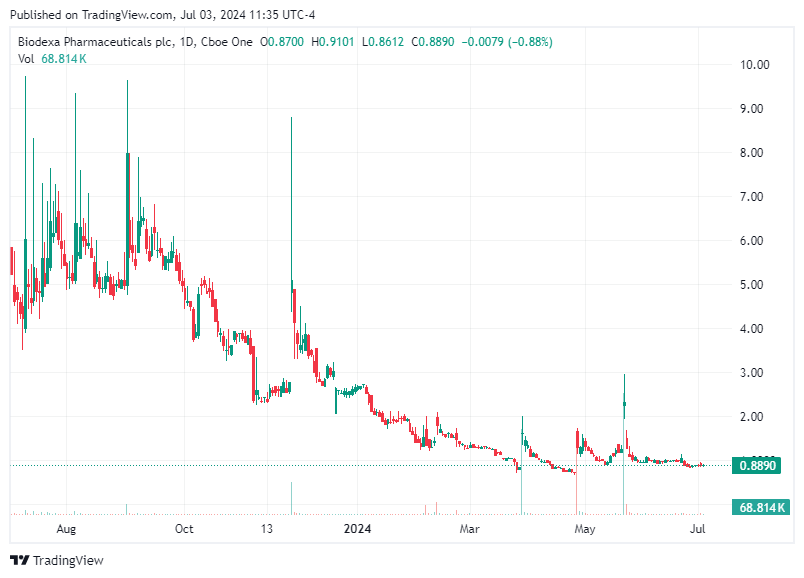Pharmaceuticals Company Reports Positive Clinical Data Results For Brain Cancer Treatment
Positive Phase 1 Clinical Data of MTX110 in DMG Brain Cancer Demonstrating Increased Survival Presented at ISPNO 2024.

Disclaimer: The information provided in this article is for educational and informational purposes only. It should not be considered as medical advice. Always consult with a healthcare professional for medical issues and before starting any new treatment.
Real-time information is available daily at https://stockregion.net
Biodexa Pharmaceuticals PLC (Nasdaq: BDRX) recently announced promising results from a Phase 1 study of MTX110, an investigational drug for the treatment of Diffuse Midline Glioma (DMG), also known as Diffuse Intrinsic Pontine Glioma (DIPG). These results were presented at the 21st International Symposium on Pediatric Neuro-Oncology (ISPNO 2024) held in Philadelphia, PA. This article delves into the details of the study, the results obtained, and the potential implications for future treatments of this orphan pediatric brain cancer.
Study Overview
The primary goal of the Phase 1 study was to evaluate the safety and maximum tolerated dose of MTX110 in patients newly diagnosed with DMG. This rare and aggressive form of brain cancer predominantly affects children and has limited treatment options, making the development of effective therapies crucial. MTX110 is administered via convection-enhanced delivery (CED) using a subcutaneous pump connected to a catheter directly implanted into the pons, the part of the brainstem involved in this type of cancer. The open-label investigator-initiated study was conducted by Columbia University Irving Medical Center. The study employed a 3+3 dose-escalating design, with patients receiving MTX110 infusions at three different dose levels (30 μM, 60 μM, and 90 μM). A total of nine patients participated in the study, categorized into three groups based on the dosage:
30 μM group: 3 patients
60 μM group: 4 patients
90 μM group (optimal dose): 2 patients
Each patient received two 48-hour infusions of MTX110, administered seven days apart. The primary endpoint was to determine the safety and maximum tolerated dose, with secondary endpoints including Progression-Free Survival (PFS) and Overall Survival (OS). The treatment was generally well-tolerated by the patients. There was one Grade 4 adverse event, which investigators assessed as unrelated to the drug but related to the infusion procedure and tumor anatomy. Most other adverse events were related to the infusion process and were graded as either Grade 2 or Grade 3. These results suggest that while there are some risks associated with the delivery method, the drug itself did not cause severe adverse reactions. Although the study was not designed to reliably demonstrate efficacy, the results were encouraging:
Median Progression-Free Survival (PFS): 10 months (range: 8 to 20 months)
Overall Survival (OS): 16.5 months (range: 12 to 35 months)
These outcomes compare favorably to historical data, where the median OS in a cohort of 316 cases was approximately 10.0 months, as reported by Jansen et al. (2015) in Neuro-Oncology.
Detailed Analysis of Results
The median OS of 16.5 months observed in this study represents a substantial improvement over the historical reference of 10.0 months. This increase in survival time is particularly noteworthy given the aggressive nature of DMG and the limited effectiveness of current treatment options. These positive outcomes justify further investigation into MTX110, potentially leading to more extensive Phase II studies. The preliminary data supports the dosage regimen used in the Phase 1 study, suggesting that doses between 60 μM and 90 μM could be optimal for future trials. In October 2020, Biodexa Pharmaceuticals announced headline results from another Phase 1 study conducted at the University of California, San Francisco (UCSF). The UCSF study (NCT03566199) aimed to determine the dosage regimen for a proposed Phase II study. Preliminary data from this study supported a dose of 60 μM to 90 μM of MTX110, depending on patient tolerance. This dose range aligns with the findings from the Columbia University study, reinforcing the potential efficacy of MTX110 within this range.
With the encouraging results from both the Columbia University and UCSF studies, Biodexa Pharmaceuticals is poised to move forward with a Phase II study. This next phase will aim to more robustly evaluate the safety and efficacy of MTX110 in a larger patient cohort. The focus will be on confirming the optimal dose, assessing long-term outcomes, and further investigating the drug's impact on progression-free and overall survival. If future studies continue to demonstrate positive outcomes, MTX110 could become a critical component in the treatment regimen for DMG. The possibility of extending survival and improving the quality of life for patients with this devastating diagnosis holds significant promise. The use of convection-enhanced delivery offers a novel approach to drug administration in challenging anatomical locations.
The Phase 1 clinical data of MTX110 in DMG presented at ISPNO 2024 offers hope for the future treatment of this aggressive pediatric brain cancer. While the study was primarily focused on safety and dosage determination, the observed increase in median overall survival is a promising indicator of the drug's potential efficacy. As Biodexa Pharmaceuticals prepares for Phase II studies, the medical community eagerly anticipates further developments that could lead to improved outcomes for patients with DMG.
Disclaimer: The information provided in this article is for educational and informational purposes only. It should not be considered as medical advice. Always consult with a healthcare professional for medical issues and before starting any new treatment.
Real-time information is available daily at https://stockregion.net



